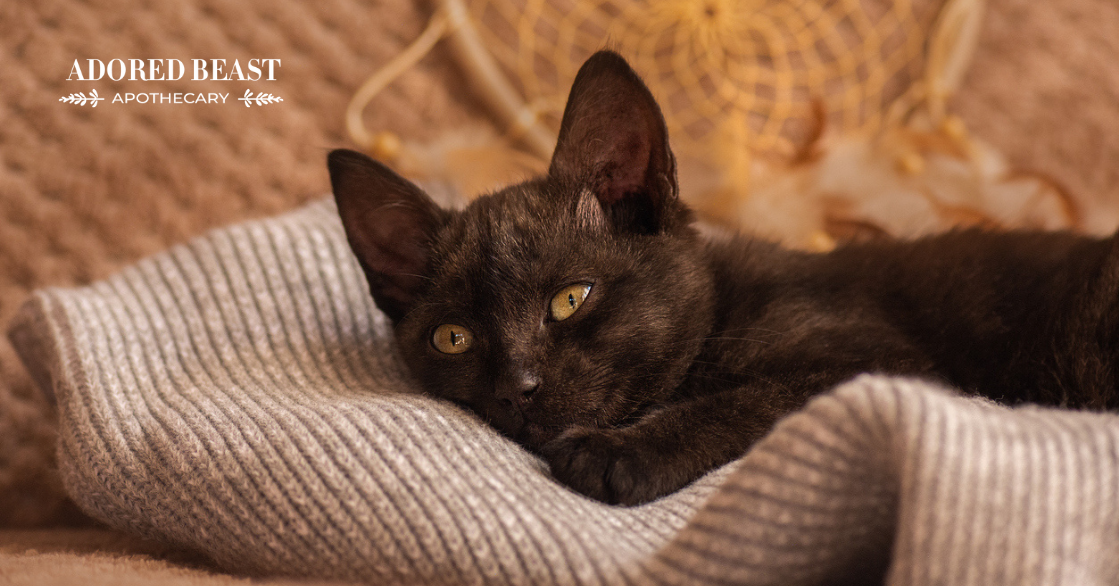Welcome to cold and flu season ladies and gentlemen. We’re sorry, that’s probably not the invitation you were hoping would show up in your inbox this week (or at any point), yet here we are.
Last week, we covered the topic of the flu with regard to dogs, and this week we’re following up by talking about the cat flu. Just as our dogs are not immune to the flu, our furry felines can also get swept up in the season.
That said, while the symptoms (which we’ll talk about in a bit) are similar to the dog flu, it isn’t the same thing. In fact, it isn’t actually one specific thing at all!
So what should you watch for and how can you help protect your kitty or manage the symptoms should they arise?
What is the Cat Flu?
First off, can cats get the flu? Well, yes, but not the kind of flu you might be thinking of. The term “cat flu” applies to a variety of feline upper respiratory infections with symptoms that are very similar to a human cold.
These upper respiratory infections are not caused by flu viruses (as would be the case with dogs or humans), but from other types or feline viruses and bacterial infections. These infections mostly affect the nose and throat.
The 2 most common are feline herpes virus (FHV-1) and feline calicivirus (FCV). Together, they account for about 90% of upper respiratory infections in cats.
Both are incredibly contagious, and can spread very quickly from cat to cat. Similarly to the flu in humans or dogs, these viruses spread directly, such as through saliva and nasal/eye fluids, or indirectly, such as through shared food and water bowls, toys, beds, or even your hands.
Young kittens and senior cats are at higher risk, as are those who live in shelters or catteries.
Signs and Symptoms
While the dog flu is typically mild, with symptoms clearing up with TLC at home within a few days, the cat flu can be more serious. If these respiratory illness are left untreated, they can become life-threatening, especially in kittens and cats with other underlying health conditions.
That makes it really important to know what signs and symptoms to watch out for so that you can act fast to minimize the severity and get your kitty back to their best self as soon as possible.
Common symptoms of the cat flu include:
- Sneezing
- Runny nose
- Watery eyes
- Lethargy
- Coughing
- Mouth or eye ulcers
- Fever
- Loss of appetite
- Difficulty breathing
Additionally, if you are unable to catch the initial infections, secondary bacterial infections may develop, which can make symptoms worse.
If you notice any of these symptoms, it’s important to reach out to your trusted veterinarian (but don’t rush to the vet). Get their advice on how to proceed. If a visit is recommended, your vet may want time to prepare the clinic to protect other cats from catching the virus, and as a result you may be asked to enter through a different door. This will help prevent the spread, but ensure your cat gets in if they need to.
Prevention and Management
The therapy you use to treat cat flu will vary.
For example, if the symptoms are caused by the feline herpes virus, there isn’t actually a cure. Cats who get FHV will carry it for the rest of their lives. But, thankfully, there are many things you can do to help avoid “flare-ups,” including reducing stress, feeding a fresh food diet, removing irritants from your cats environment, and supporting your cat with various supplements. For more details, please read this post: Feline Herpes Virus: Caring for Your Kitty.
In general, supporting the immune system is an ideal way to combat flu symptoms, especially mild ones. There are a variety of different supplements that can help balance out the immune system to keep it functioning at ideal levels. Omega-3 fatty acids are a good place to start, as are pre- and probiotics to help friendly bacteria flourish in the gut. Immune-boosting herbs and mushrooms, homeopathics like nat mur, lysine, and sometimes natural anti-viral herbs are appropriate. Lysine and manuka honey are also valuable additions. Please work with your holistic veterinarian, herbalist, or natural practitioner to make sure your supplement support is set for your specific feline friend.
Hydration is really important. You want to make sure your feline friend is getting enough water and eating a moisture-rich diet. Bone broth is a really helpful option as it contains valuable nutrients along with the added moisture. Here’s how to make it!
A few alterations to your cat’s environment can also help:
- Remove any irritants from the environment can significantly reduce the pressure on the respiratory system.
- Try steam therapy, such as through a humidifier or in a warm bathroom, can help open up the airways and relieve congestion.
No matter who lives in your home, the flu can be a pain in the butt. For our cat’s specifically, it can be very uncomfortable and vary from mild to severe. If your cat gets the flu, it’s important to monitor the symptoms and provide the care that will get them back to optimal health. In most cases, particularly non-FHV cases, cats recover from cat flu fully within a few days to a couple of weeks. The bottom line here is that, with the proper nutritional and supplemental support and a lot of TLC, your feline friend can kick the cat flu to the curb, naturally!












